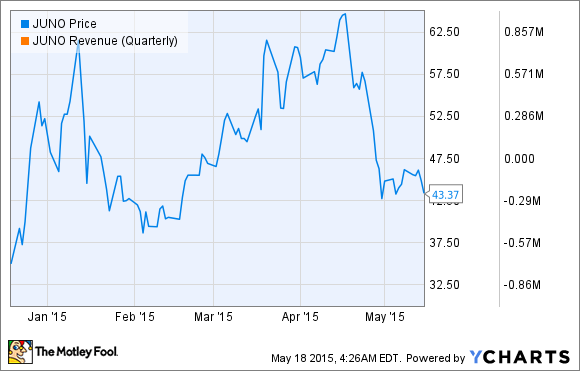Billionaire and political activist George Soros is a legend among hedge fund managers due to his uncanny ability to consistently beat the broader market. Soros' various funds have regularly generated returns that top 20% annually, throughout his career as a money manager.

Source: Flickr via user Norway UN
One of Soros' keys to success has been his penchant for buying small and mid-cap stocks chock-full of risk -- stocks that most others wouldn't dare to touch with a ten foot pole.
Per the first-quarter 13F filings with the SEC, we learned that the Soros Fund Management continued this proud tradition by upping its stake in the clinical-stage biopharma Juno Therapeutics (JUNO +0.00%) by a whopping 313%.
This buy is particularly notable because the biotech has no approved products and is working on an unproven type of cancer treatment, namely CAR-T cell therapy. Put simply, the company may never make the giant leap from development biotech to commercial operation.
In light of his stellar track-record, though, I think it's worth asking if this super high-risk, high-reward stock deserves a deeper dive from average investors.
A speculative immuno-therapy play
Immuno-therapy companies have been popping up left, right, and center lately. Moreover, former privately-held entities like Juno have increasingly decided to go public to take advantage of the widespread interest investors have in this technology right now. Why? Because immuno-therapies are expected to become the dominant form of cancer care by 2030, potentially leading a revolution toward "chemo-free" care in the process.
That said, most of these companies remain highly speculative investments, given the current state of their respective platforms. And Juno is no exception.
Juno's platform employs modified T cells (CARs and TCRs) to treat a range of blood-based cancers (various types of leukemia) and a handful of solid tumors. Even so, the company is still in the early stages of clinical testing, shown by this snapshot of its current pipeline:

Source: Juno
As a way to accelerate the development of its platform, the company has partnered with AstraZeneca (AZN +0.55%) to explore combination therapies with the big pharma's closely watched PD-L1 checkpoint inhibitor Medi4736. And Juno recently purchased Stage Cell Therapeutics GmbH for its cell selection and activation capabilities.
Nevertheless, Juno is at least two years away from bringing a product to market, and that's assuming the company is able to push a clinical candidate toward approval via an accelerated regulatory pathway.
That's why I believe Soros' investing thesis centers around the general excitement growing around immuno-therapies -- rather than anything to do with Juno specifically. In other words, I don't see his fund holding this risky stock for the long-term.
Is Juno a buy right now?
Although Juno's shares have pulled back in a big way from their former highs, I think it's important to keep in mind that the company still has a market cap of nearly $4 billion, despite having zero product revenue -- hence the lack of orange on the following graph:
Juno is also lagging behind Kite Pharma (NASDAQ: KITE) in the race to commercialize a CAR T cell therapy, and may have a less potent platform than another CAR T player with a far smaller market cap, Bellicum Pharmaceuticals (BLCM +0.00%).
Overall, I think Juno's market cap is a tad rich for a clinical-stage biopharma with an unproven platform, especially one that is already facing significant competition. So while Juno may turn out to be another one of Soros' high-risk gems, I'm happy watching this company from the safety of the sidelines for the time being.

